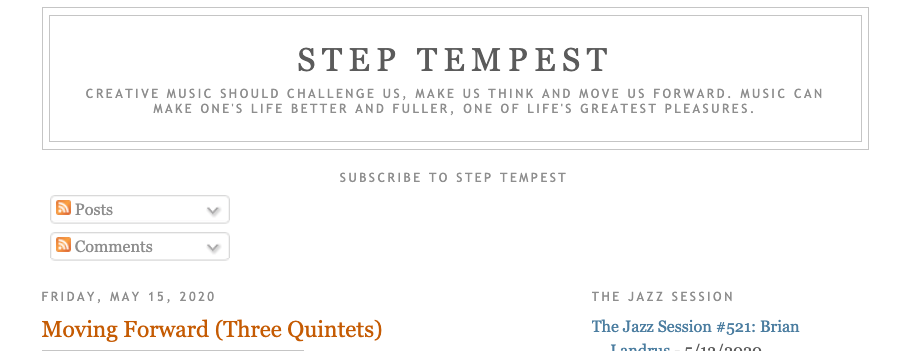endectomorph music
Menu
Endectoblog
"A formidable debut for an artist who looks to have a great future" Richard Kamins reviewed Hayoung Lyou's Metamorphosis over at his blog, Step Tempest. Read the original post at his website, which includes reviews of Tineke Postma's Freya as well as Anne Mette Iversen's Racing the Butterfly. The review of Metamorphosis is also copied below: Review of Metamorphosis
Step Tempest by Richard Kamins May 15, 2020 There is not a lot of biographical information available about pianist and composer Hayoung Lyou, a native of Seoul, Korea, but her musical pedigree is impressive. She attended Berklee College of Music and graduated from the New England Conservatory of Music. Ms. Lyou, who now lives in New York City, has studied with Ran Blake, Hal Crook, Helen Sung, Joanne Brackeen, Jason Moran, and Ethan Iverson. For her debut album, she organized a quintet featuring her piano, bassist Simón Willson, drummer Dayeon Seok, and two reed players, Jasper Dutz (alto saxophone, clarinets) and Jacob Shulman (tenor saxophone). Her original music is not only influenced by the artists she has studied with but also the writing of Hermann Hesse (1877-1962), whose 1919 book "Demian" is extremely popular in her native land, and psychologist Carl Jung (1875-1961), especially hs theory of "animus" (the personification of male tendencies in a woman). All that and more serves as the foundation of "Metamorphosis" (Endectomorph Music), Ms. Lyou's debut album. The program consists of 11 original pieces by the pianist including four pairs of songs, the first three of which are followed by short works all titled "Animus". These pieces, numbered "I", "II", and "III", do have a harder edge and, in the instance of the longest one, "II", which clocks in at 1:30, and is a roiling alto sax solo over the churning rhythm section. The title track opens with dark and sparse piano chords (reminiscent of Ran Blake) but the alto and tenor saxophones bring a different light to the ballad. Seok's drums are quite dramatic in the opening two minutes before he moves in to keeping the rhythm flowing. The unaccompanied piano solo also is quite dramatic as it rolls forward "Night Person" opens up with a quick allusion to "Giant Steps" before dropping into a groove that may remind some of Wayne Shorter. There's an airiness in the saxophones' interaction that soon gives way to an intensity as the rhythm section pushes them forward. The majestic piano chords and powerful drumming of "Busan" pay tribute to the arrival of 14,000 North Korean children in South Korea's second-largest city in the midst of the Korean and how they use their wits to survive. The singing quality of the saxophones imbues the music with youthful voices. The song inspired by Hesse's book "Demian" has a gentle melody played by the tenor sax and clarinet over a rhythm that sounds influenced by the music of Burt Bacharach. The piano solo near the close of the piece, featuring fine bass counterpart from Willson, is quite melodic and impressionistic. The two closing tracks include the lovely and classically inspired solo piano work "Solitude" plus the lilting, joyous, "A Sunny Day at Yankee Stadium". The latter piece, played sans reeds, is a delightful jaunt through the ballpark, the dancing piano phrases interspersed with full chords while the bass and drums keep the music light and delightful. "Metamorphosis" introduces most of the listening world to the music of Hayoung Lyou. Her playing is impressive, the band serves her intentions well, and compositions are filled with delightful turns of phrases and changes in direction. A formidable debut for an artist who looks to have a great future.
1 Comment
|
kevin sunblog guardian. Categories
All
|
Proudly powered by Weebly

 RSS Feed
RSS Feed